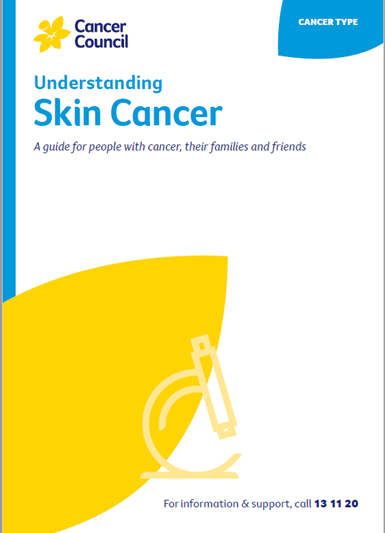- Home
- Skin cancer
- Treatment
- Cryotherapy
Cryotherapy
Cryotherapy, or cryosurgery (freezing), is a procedure that uses extreme cold (liquid nitrogen) to remove sunspots, some small superficial basal cell carcinomas (BCCs) and squamous cell carcinomas (SCC) in situ (Bowen’s disease).
How it’s done
The GP or dermatologist sprays liquid nitrogen onto the sunspot or skin cancer and a small area of skin around it. You may feel a burning or stinging sensation, which lasts a few minutes. The liquid nitrogen freezes and kills the abnormal skin cells and creates a wound. In some cases, the procedure may need to be repeated.
What to expect after
The treated area will be sore and red. A blister may form soon after. A few days later, a crust will form on the wound. The dead tissue will start to fall off 1–6 weeks later, depending on the area treated.
New, healthy skin cells will grow and a scar may develop. The healed skin may look paler than the surrounding skin.
Learn more about the different types of skin cancer.
→ READ MORE: Topical treatments for skin cancer
Podcast: Making Treatment Decisions
Listen to more podcasts for people affected by cancer
A/Prof Victoria Mar, Director, Victorian Melanoma Service, Alfred Hospital and Monash University, VIC; Tracey Bilson, Consumer; Raelene Buchan, Consumer; Alison Button-Sloan, Consumer; Dr Margaret Chua, Radiation Oncologist, and the Skin Radiation Oncology team, Peter MacCallum Cancer Centre, VIC; Prof Anne Cust, Deputy Director, The Daffodil Centre, The University of Sydney and Cancer Council NSW, Chair, National Skin Cancer Committee, Cancer Council, and faculty member, Melanoma Institute Australia; A/Prof Paul Fishburn, Skin Cancer Doctor, Norwest Skin Cancer Centre, NSW and Faculty of Medicine, University of Queensland; Danielle Goss, Melanoma Clinical Nurse Specialist, Amie St Clair Melanoma (part of Melanoma Institute Australia), Wagga Wagga, NSW; Louise Pellerade, 13 11 20 Consultant, Cancer Council WA: Dr Shireen Sidhu, Head of Dermatology, The Royal Adelaide Hospital, SA; Dr Amelia Smit, Research Fellow – Melanoma and Skin Cancer, The Daffodil Centre, The University of Sydney and Cancer Council NSW; Dr Tony Tonks, Plastic and Reconstructive Surgeon, Canberra Plastic Surgery, ACT.
View the Cancer Council NSW editorial policy.
View all publications or call 13 11 20 for free printed copies.
